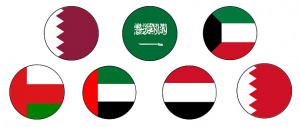Language/Gulf-arabic/Grammar/Questions
Hi Gulf Arabic learners! 😊
In this lesson, we will focus on questions in Gulf Arabic. Asking questions is an essential skill in any language, and Gulf Arabic is no exception. Knowing how to ask questions will help you better communicate with native speakers and understand the language on a deeper level.
With the completion of this lesson, consider investigating these related pages: How to Use "Have", Negation & Give your Opinion.
Basic question structure[edit | edit source]
In Gulf Arabic, like in any other language, questions have a specific structure. Basic questions in Gulf Arabic begin with a question word such as “ماذا (maadha)” meaning “what”, “مَنْ (man)” meaning “who”, “كَمْ (kam)” meaning “how many”, “مِنْ (min)” meaning “from”, “أَيْنَ (ayn)” meaning “where” and “مَتَى (mataa)” meaning “when”. The word order is similar to English, and depending on the question word, the order may differ slightly.
Here's a simple table illustrating the word order for questions in Gulf Arabic:
| Question Word | Word Order |
|---|---|
| ماذا (maadha) | Question word + Verb + Subject + Object |
| مَنْ (man) | Question word + Verb + Subject |
| كَمْ (kam) | Question word + Verb + Subject + Object |
| مِنْ (min) | Question word + Verb + Subject |
| أَيْنَ (ayn) | Question word + Verb + Subject |
| مَتَى (mataa) | Verb + Question word + Subject + Object |
For example:
- ماذا تريد؟ (maadha tureed?) - what do you want?
- مَنْ يعرف الجواب؟ (man yaarif aljawab?) - who knows the answer?
- كَمْ رجل في الغرفة؟ (kam rajul fi alghurfa?) - how many people are in the room?
- مِنْ أنت؟ (min anta?) - who are you?
- أَيْنَ سوف تذهب اليوم؟ (ayn sawf tadhhab alyawm?) - where will you go today?
- مَتَى تشتري السيارة؟ (mataa tashtri alsayyara?) - when will you buy the car?
Yes or no questions[edit | edit source]
In addition to basic questions, you may also want to ask yes or no questions in Gulf Arabic. Yes or no questions are questions that require a simple “yes” or “no” answer. In Gulf Arabic, yes or no questions are formed by beginning the sentence with the verb, followed by the subject.
For example:
- هل تتكلم العربية؟ (hal tatakallam alarabia?) - Do you speak Arabic?
- هل هو يعرف؟ (hal huwa yaarif?) - Does he know?
- هل يحب القهوة؟ (hal yuhib alqahwa?) - Does he like coffee?
Question words in context[edit | edit source]
To better understand how to use Gulf Arabic question words in context, let's create a dialogue.
- Person 1: شو معنى هالكلمة؟ (shu maana hal kalima?) - What does this word mean?
- Person 2: هذا الكلمة "شمس" ومعناها "sun". (hadha alkalima "shams" wa maanaaha "sun".) - This word is "shams" and it means "sun".
- Person 1: من فيهم أخ ؟ (min fihim akh?) - Who among them is your brother?
- Person 2: أخي هو اللي في الوسط. (akhii huwa alladhi fi alwasat.) - My brother is the one in the middle.
- Person 1: أين يمكنني أن أجد المطعم؟ (ayn yumkinuni an ajid almat'am?) - Where can I find the restaurant?
- Person 2: المطعم على اليسار من الشارع الرئيسي. (almuta'am 'ala alyasar min alshari' alraiysi.) - The restaurant is on the left of the main street.
Negation and question words[edit | edit source]
In Gulf Arabic, negation with question words is not very different from negation without question words. The negation word "لا" (la) is simply added in front of the question word. For example:
- لا ماذا تريد؟ (la maadha tureed?) - What do you not want?
- لا مَنْ يعرف الجواب؟ (la man yaarif aljawab?) - Who doesn't know the answer?
- لا كَمْ رجل في الغرفة؟ (la kam rajul fi alghurfa?) - How many people are not in the room?
- لا مِنْ أنت؟ (la min anta?) - Who are you not?
- لا أَيْنَ سوف تذهب اليوم؟ (la ayn sawf tadhhab alyawm?) - Where will you not go today?
- لا مَتَى تشتري السيارة؟ (la mataa tashtri alsayyara?) - When will you not buy the car?
It's important to note that unlike in English, the verb does not change when using negation with question words in Gulf Arabic.
Recap[edit | edit source]
In summary, asking questions is an important part of learning Gulf Arabic. Basic questions start with a question word, followed by the verb, subject, and object. Yes or no questions in Gulf Arabic begin with the verb, followed by the subject. Negation with question words is formed by adding "لا" in front of the question word.
To improve your Gulf Arabic Grammar, you can also use the Polyglot Club website. Find native speakers and ask them any questions!
Sources[edit | edit source]
Other Lessons[edit | edit source]
- Conditional Mood
- Gender
- How to Use Have
- How to Use Be
- Plurals
- Negation
- Adjectives
- Give your Opinion
- Pronouns

